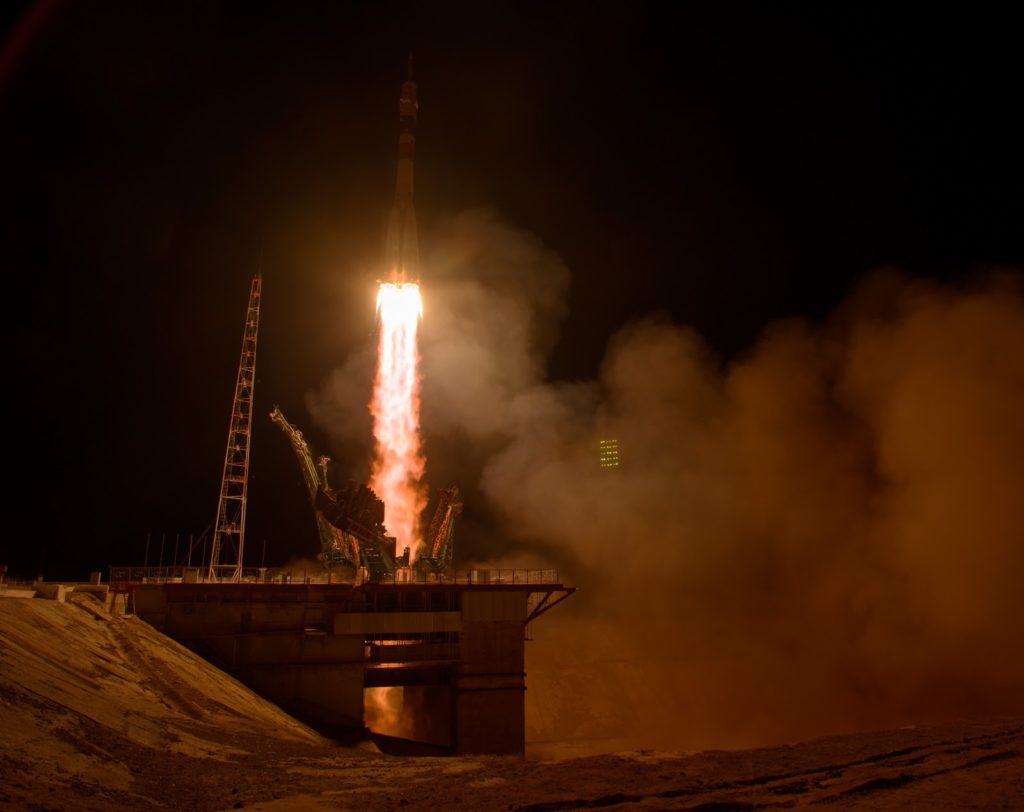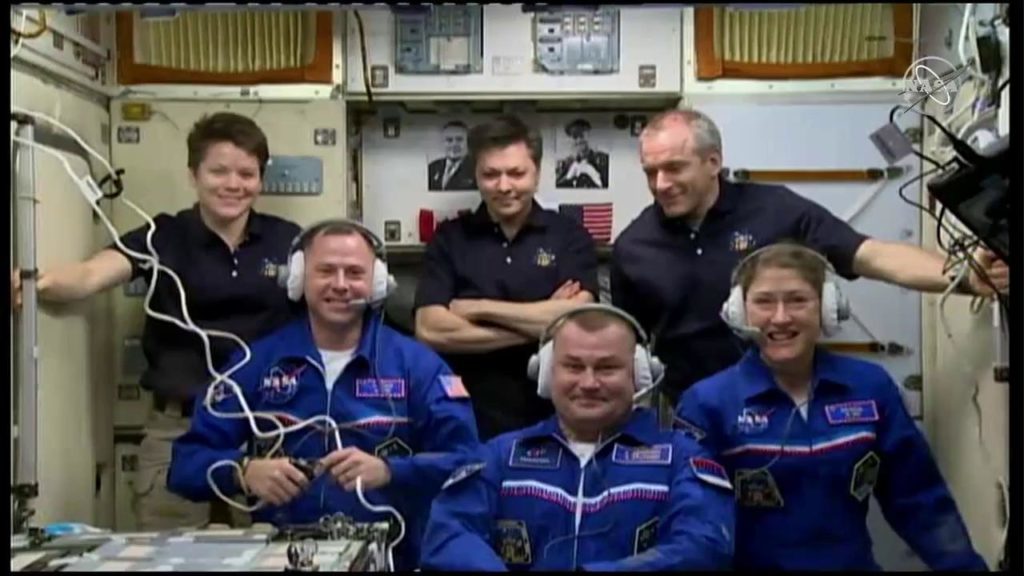Ken Kremer —SpaceUpClose.com &
RocketSTEM –14 March 2019
CAPE CANAVERAL, FL – The second time was indeed the charm for the
relaunched Russian/American Soyuz Crew from last October’s harrowing in flight abort
as they were joined this time by another NASA astronaut and successfully blasted
off this afternoon, (Thursday, March 14 Eastern time, Friday March 15 Kazakh
time) from the Baikonur Cosmodrome and docked their MS-12 spacecraft this
evening at the International Space Station
(ISS).
For today’s launch of the Soyuz MS-12 spacecraft
carrying Nick Hague
and Christina Koch
of NASA and Alexey Ovchinin
of the Russian space agency Roscosmos, the trio launched flawlessly and on time at 3:14 p.m.
EDT and in the middle of the night (12:14 a.m. Friday Baikonur time) from the
Baikonur Cosmodrome in Kazakhstan.
Hague, Koch and Ovchinin docked to the space
station’s Rassvet module at 9:01 p.m. EST March 14 after a fast track four-orbit,
six-hour journey.
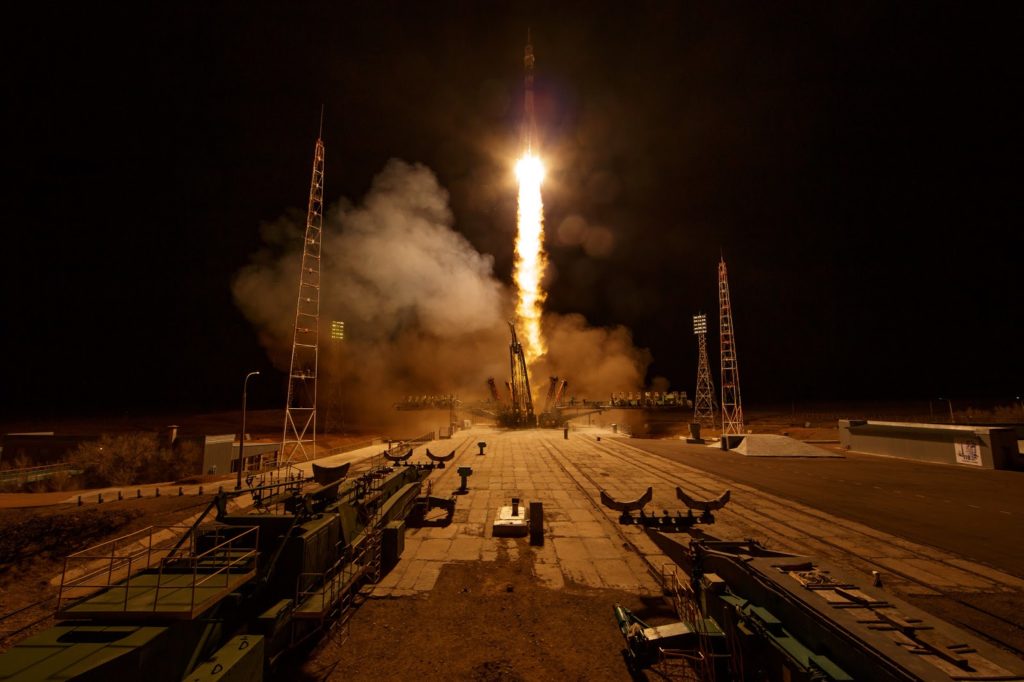 |
|
The Soyuz MS-12
spacecraft is launched with Expedition 59 crewmembers Nick Hague and Christina Koch of NASA, along with Alexey Ovchinin of Roscosmos, Friday March 15, 2019, Kazakh time (March 14 Eastern time) at the Baikonur Cosmodrome in Kazakhstan. Hague, Koch, and Ovchinin will spend six-and-a-half months living and working aboard the International Space Station. Photo Credit: (NASA/Bill Ingalls) |
members to be sure, and even more so for Hague and Ovchinin whose Soyuz launch
failed two minutes after liftoff last October when one of the four first stage
strap on boosters failed to jettison properly.
they parachuted to safely following the first manned Soyuz launch failure in
about 30 years.
the hatch between the two ships late this evening at approximately 11.07 p.m. and
were welcomed aboard the orbiting laboratory.
 |
| Soyuz MS-12 approaches ISS. Credit: NASA |
joined the three Expedition 58 crew members already on board.
crew of six from the US, Russia and Canada officially began at the time of the
Soyuz MS-12 docking.
six-and-a-half months living and working aboard the International Space Station.
restores the station’s crew complement to six.
They have joined Anne McClain
of NASA, David
Saint-Jacques of the Canadian Space Agency and Expedition 59
Commander Oleg Kononenko of
Roscosmos.
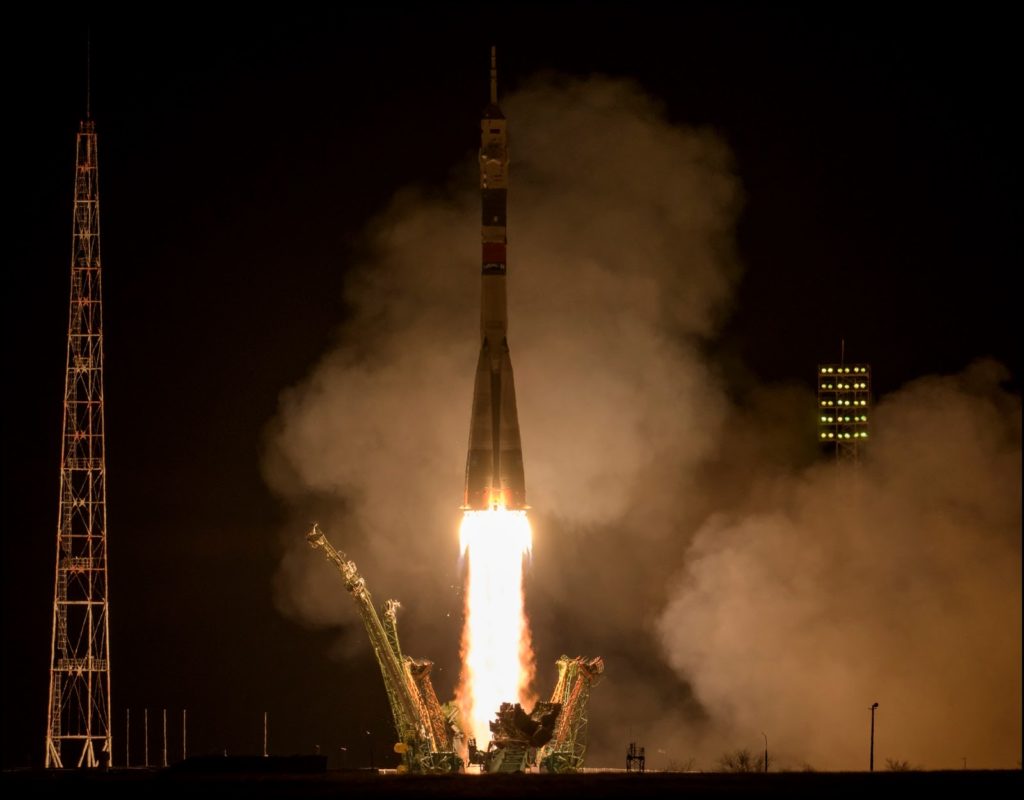 |
|
LIFTOFF! Expedition 59 crew @Astro_Christina, @AstroHague, and
Alexey Ovchinin are on their way to @Space_Station! Credit: NASA/Bill Ingalls |
The crew members will spend more than six months
conducting about 250 science
investigations in fields such as biology, Earth science, human
research, physical sciences, and technology development. Seventy-five of the investigations
are new and have never been performed in space. Some of the investigations are
sponsored by the U.S. National
Laboratory on the space station, which Congress designated in
2005 to maximize its use for improving quality of life on Earth.
devices that mimic the structure and function of human organs, free-flying robots, and an instrument to
measure Earth’s distribution of
carbon dioxide.
Cygnus and SpaceX Dragon – are scheduled to arrive with science to
support those investigations and additional supplies for the crew.
begin final preparations to venture outside the station’s Quest airlock for
three planned spacewalks. On March 22 and 29, pairs of spacewalkers will
replace nickel-hydrogen batteries with newer, more powerful lithium-ion
batteries for power channels on one pair of the station’s solar arrays. On
April 8, spacewalkers will lay out jumper cables between the Unity module and
the midpoint of the station’s backbone to establish a redundant power path to the
Canadian-built robotic arm, known as Canadarm2, and enhance computer network
capabilities. The March 29 spacewalk with McClain and Koch is scheduled to be
the first-ever spacewalk with all-female spacewalkers. As with all spacewalks,
crew member assignments are subject to change due to real-time operations.
test flights of NASA’s
Commercial Crew Program, which will return human spaceflight
launches for space station missions to U.S. soil.
scheduled to remain aboard the station until June, while Hague, Koch and
Ovchinin are set to return to Earth early this fall.
Hague and Ovchinin now have completed a journey
to the station that initially was planned for Oct. 11, when a booster
separation problem with their Soyuz rocket’s first stage triggered an abort two
minutes after launch, resulting in a safe return to Earth. They were reassigned to
fly again after McClain, Kononenko and Saint-Jacques launched for
Expedition 58 in early December. This is Ovchinin’s third flight
into space, the second for Hague and the first for Koch. NASA selected all
three astronauts in the Expedition 59 crew in the 2013 astronaut
class.
For more than 18 years, humans have lived and
worked continuously aboard the station, advancing scientific knowledge and
demonstrating new technologies, making research breakthroughs not possible on
Earth that will enable long-duration human and robotic exploration into deep
space, including the Moon and Mars. A global endeavor, 236 people
from 18 countries have visited the unique microgravity laboratory that has
hosted more than 2,500 investigations from researchers in 106 countries.
Investigations conducted on the International Space Station impact the daily
lives of people on Earth and prepare the way for humans to venture farther into
space.”
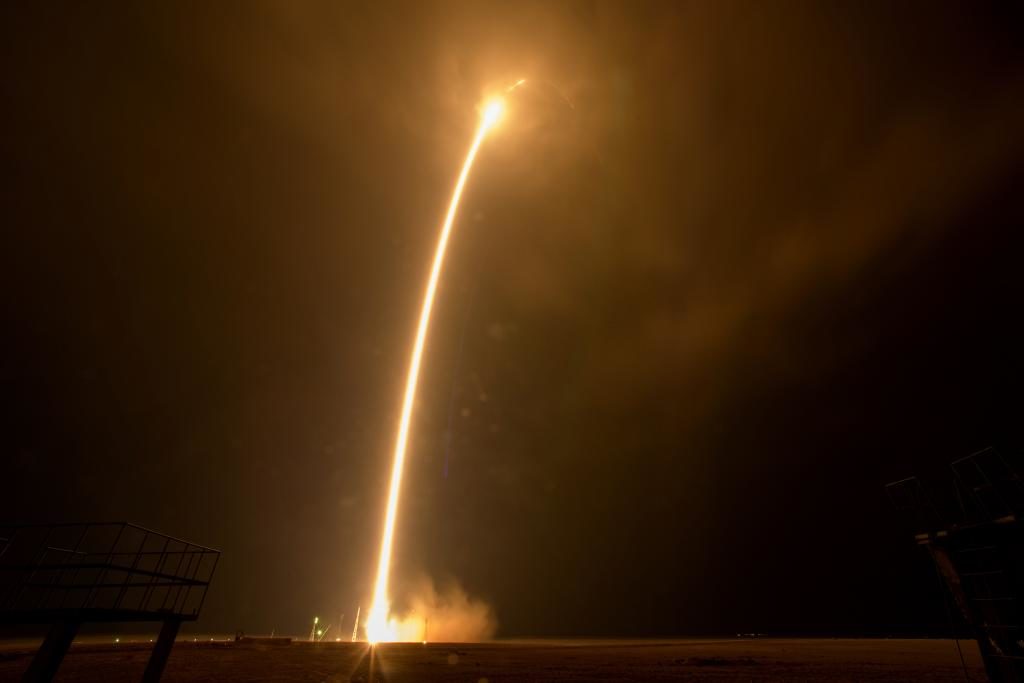 |
|
Streak
shot of Expedition 59 launch Friday March 15, 2019, Kazakh time (March 14 Eastern time) at the Baikonur Cosmodrome in Kazakhstan. Photo Credit: (NASA/Bill Ingalls) |
Watch for Ken’s continuing
onsite coverage of NASA, SpaceX, ULA, Boeing, Lockheed Martin, Northrop Grumman
and more space and mission reports direct from the Kennedy Space Center, Cape
Canaveral Air Force Station, Florida and Wallops Flight Facility, Virginia.
Stay tuned here for Ken’s continuing Earth and
Planetary science and human spaceflight news: www.kenkremer.com –www.spaceupclose.com – twitter @ken_kremer
– email: ken at kenkremer.com
Dr. Kremer is a research scientist and journalist based in the KSC
area, active in outreach and interviewed regularly on TV and radio about space
topics.
Ken’s photos are for sale and he is available for lectures and outreach events
Learn more about the upcoming/recent ULA Delta 4 WGS-10, SpaceX Demo-1, Falcon 9 Nusantara Satu launch, USAF GPS 3-01, SpaceX Falcon 9/CRS-16 launch
to ISS, NASA missions, ULA Atlas &
Delta launches, SpySats and more at Ken’s upcoming outreach events at Quality Inn Kennedy Space Center, Titusville,
FL, evenings:
Mar
15/16: “ULA Delta 4 WGS-10
launch, SpaceX Falcon 9 Demo-1 and Nusantara Satu launch, Dragon CRS-16 resupply launch to ISS, SpaceX
Falcon GPS 3-01, SpaceX Falcon Heavy & Falcon 9 launches, upcoming SpaceX
Falcon 9 USAF GP3 3-01, NRO & USAF Spysats, SLS, Orion, Boeing and SpaceX
Commercial crew capsules, OSIRIS-Rex, Juno at Jupiter, InSight Mars lander, Curiosity
and Opportunity explore Mars, NH at Pluto, Kuiper Belt and more,” Kennedy Space
Center Quality Inn, Titusville, FL, evenings.
Photos for sale
Ken’s
upcoming talks:
Apr 3: “Exploring
Mars; The Search for Life & A Journey in 3-D.” 7 PM, Lawton C
Johnson Middle School, Summit, NJ


